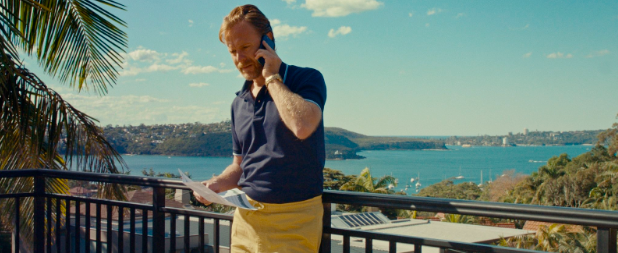
Julian Garner as Richard
The Big Dog is a unique entry in the indie scene, never before had I seen a debut so confident in its writing. The film follows Rich, a stockbroker with a findom fetish who one morning discovers that his secret dominatrix has drained accounts dry. With an incel for a son and a marriage on the rocks Rich has one day to recover the money and save what is left of his reputation.
Last week The Big Dog was unleashed into Dendy cinemas across the country. To celebrate Flynn Boffo spoke with its director Dane McCusker and Co-Producer Jess Murphy.
Flynn Boffo: I haven’t seen an Australian film this confident in its writing in a long time, and to have a film that magnifies the subtleties in each performance. This is a film which is driven by the characters and the writing. I wanted to talk to you first about how the story began.
Dane McCusker: I had about five finished feature screenplays that I was going into AFTRS to possibly make but this was something I came up with in the school. Initially the idea came from an Instagram reel that I saw and it was the first scene of the film.
I just suddenly knew exactly the world of that story and that character and where that could go. The initial first draft came pretty quickly and then it was a lot of development script wise to get it. to where it is now.
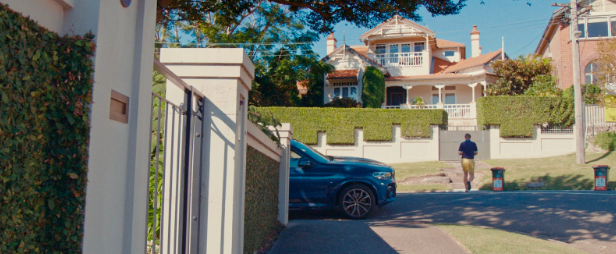
FB: I was very impressed by the relevance of this story. We’re currently experiencing a housing crisis and there’s definitely a turn against the rich taking place, particularly that sort of North Shore rich of Sydney.
Recently, with Birdeater and a couple other films of your contemporaries, there has been a re evaluation of toxic male figures. You have spoken about how your other short films deal in this, this region, what’s the draw to you?
DM: There was a film that I made in 2016, a short called Angel Fish. It was made at the beginning of the #MeToo movement, there were a lot of high profile cases which triggered a reevaluation of masculinity and privilege. It was just in the air at that time, and when I wrote that short in particular, It seemed to strike a chord in a way that other shorts that I had written hadn’t.
I knew that territory when I was writing it, I could understand a certain male privilege from that perspective and how toxic that could be. It felt like there was more to explore so I made a second short with Jess about similar kind of thematic territory. When I came to this one, it just felt like there was more in the tank to write about.
Toxic masculinity is such a far reaching and pervasive issue that touches on so many areas of life and with this one in particular, it looks at it through the lens of family, wealth and the internet.
Jess Murphy: Even at Sydney Film Festival. Wasn’t it Nashen Moodley? he said, “There’s so many films about toxic masculinity this year”, most made by men who are talking about it. I think it’s a good thing. Totally, a cultural shift with what men are now saying.
FB: It definitely exciting to see filmmakers stepping up into that role and feeling a responsibility to put this out in the open.
Jess, I imagine you would have been around as Dane was conceiving it. When did you step into the picture?
JM: I had produced a short with Dane and two others, early on I came to Dane and was like, I would like to work on it. I feel like I’m missing out on something really exciting and I have the skills and I know I can do it. It’s an interesting balance of financing our lives versus financing an indie. We came together but I did say I will need someone else to help produce this though because it’s so tricky.
Claudia Shepherd who was at AFTRS eventually came on and helped us out and worked a lot with the AFTRS side of management. I didn’t go to AFTRS so and they were also a bit weary of me. They’re like, are you sure you want to work with your girlfriend? Even though we’d been together for a really long time, we have nine years coming up. It was still really good having another producer working with the AFTRS team. Meanwhile, I was very much on the ground and did a lot of the post production.
FB: Was this always conceived as an AFTRS grad film? You said you conceived it at AFTRS, but did you always think of this as the one to do?
DM: I knew I was going to make a feature and I had things that I thought I was going to make when I enrolled and then covid happened and I realized, very, very quickly that none of them were going to be feasible inside AFTRS to produce.
JM: Keeping it small cast, there’s only five of them. And then keeping it in one key location with two minor locations was important. We needed to convince the school that we were not gonna stress anyone out too much.
FB: I was really struck by the tension that you build amongst the cast. It’s a very similar sort of tension to Shiva Baby (2021) but in a completely new context, a Sydney context. These are the people that we see driving through the city in their Mercedes.
JM: It’s really funny you say that, me and Dane stayed in the Mosman house, which we shot the film in and we went up to the local coffee store and saw the guys dressed exactly as Richard is dressed. We saw it a lot and even in another location we faked the exterior for the front house.
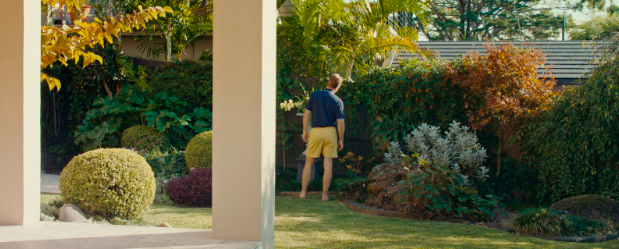
FB: It’s an iconic costume as well, with the little yellow shorts and the, the blue polo tucked in.
JM: They dressed like that, we got it right.
DM: It was really funny too because the first, third of the movie is shot in a way that’s really, really quiet and austere there’s very, very little camera movement. Cinematographer Oliver Hay and I were designing these frames that would feel quite awkward.
But every time we’d frame up, we’d realise that the shorts were always central to the frame. And after a while, once we started noticing that, we had to lean into this. The shorts are the most iconic. Every, every time we’ve seen them in the first 20 minutes of the movie, they’re so prominent.
Always right in the centre of the frame. I’m so glad you mentioned that. Just seeing the shorts and knowing that, the G-String is under it was just something that we, we couldn’t not like have
FB: It’s a wonderful little device that you have there and something that doesn’t take a lot to do, but it just says so much. You feel that tension there, along with the score, especially strings that felt really powerful. It’s almost like someone was plucking the G-String itself. How did you find your musicians?
DM: The composer was an after student, Sam Weiss. He’s so talented. We spent a long time kind of throwing references back and forth to find that sound. We talked really early on from the beginning about the progression of music throughout it and how it would kind of build over the course of 90 minutes.we were really interested in textures and it was always about having the most, viscerally uncomfortable string sounds and really closely miking everything so that you got a really taut, tense, uncomfortable sound that just didn’t really ever let up.
Even in the edit, in the picture edit the editor Jared Young kept finding that the cut would just drink up music. Every time we put more music in, it just felt better and better and better so we kept putting more and more and more. It was only improving it. I’m sure we got to a point where it was too much and we stripped it back, but yeah, there’s definitely more music in the final film than was meant to be.
JM: I remember when the musicians recorded it, we were putting the mic so close to the string that they would have to say to them “can you just not breathe for a second because you can hear your breathing while we’re trying to record the plucking of the strings.
FB: I want to go now to the cast, I was really blown away, of course Julian Garner is incredible as Rich, but in addition to that you had such a great ensemble.
A real standout for me was Rich’s son played by Michael Monk. I don’t think I’ve seen an incel played with such vulnerability before, and it’s a completely convincing character. Even that thing he does with his eyes, it’s remarkable.
DM: We worked with a casting director, Dani Long and she was great. She found all of them for us. We saw a lot of people. For all of the roles, Michael was someone that just had such an interesting look and could play that character with a vulnerability. I think a lot of people looked at it as making fun of incels, but he really found it and was able to pull out that saltiness.
JM: A lot of it is that they really had a minimal rehearsal time. Dane only had maybe a week with them, so they brought a lot of their own work and practice into them.
FB: Was there, was there any improvisation?
DM: The most improv stuff was done in rehearsal doing a kind of deep background improv techniques. There’s a big thread in Kelly and Richard’s relationship, where they have this shared memory that features in the later part of the film. So I think it was a quarter of rehearsal time on day one, just improving scenarios that happened so that we could build a bank of memories that they could kind of think about during those scenes.
FB: I’m really interested in the character of Paige. That’s a character for me, it feels she might have been one of the last things to bring it together. At what point did Paige emerge?
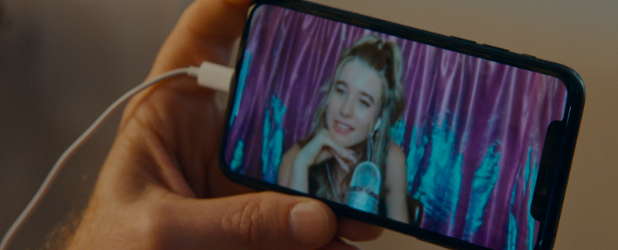
DM: Actually Sam the son was the last piece of the puzzle to click into place. Paige was there pretty early on. Findom was always there from the beginning and writing the scenes between Richard and Paige came quickly because it’s such a fun dynamic to write on the page. Having this complete dynamic shift, this guy that’s so always in control suddenly be so submissive to like a young woman was, was such a great dynamic.
How she exploits that was such a fun thing to write but then her reservations about what she’s doing and all that kind of stuff and her conversation with her housemate Shanti that stuff was, was there pretty early on because a lot of the meat of using findom came from just researching, it was a fetish that kind of became really written about very quickly.
Publications like Vice latched on and started writing about findom I think in the popularity of it becoming so present so quickly, a lot of young women were reading this stuff and rushing into it to make money by just being mean to people on the internet without really understanding the nuances of like the domination part of it, or the dom sub dynamics.
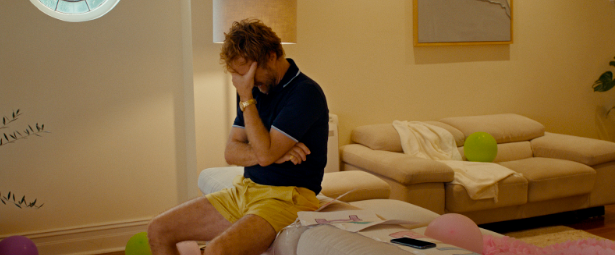
FB: I love that you never put any characters on a moral pedestal. Every character has some for some element of themselves that they still are figuring out.
DM: Also by the same token, none of them are like irredeemable people as fun as it is to make fun of Richard you know, there is still a humanity in him that hopefully over the course of this story you’ll come to understand. Everyone has the capacity to change and be better. Even though he doesn’t have this huge epiphany, I think losing everything is one of those moments that will hopefully trigger someone like that to have a bit of self reflection.
I think that was, it was something that was very front of mind when I was writing, that none of them are necessarily the good guy and none of them are necessarily the bad guy. It’s just a bunch of people in a really weird messy situation just struggling to get through.
FB: Honestly, this is just a really exciting debut for both of you. I’m really looking forward to seeing what you do next. At this very early stage in what is looking like a very promising career, what sort of advice would you have to inspire the next generation?
DM: The big thing is learning craft skills is a big one and practicing them across writing and dramaturgy and directing, but also just being open to life experience. You could be the best filmmaker, but if you don’t have opinions on things and a point of view, then it’s pretty moot.
So I think developing a wide range of interests and finding your taste is really important and as important as learning about camera angles and technical stuff.
JM: I Would say you just have to jump into it There’s so much with creatives, where you hold yourself back, and it’s not good enough, or it’s not this. There’s so much that you learn. It’s real practice where you’re learning on the go.
Especially from a producing point of view you just have to keep doing it. It’s like riding a bike, and you’ll just keep getting better. Just give it a go.
The Big Dog is screening today in Dendy cinemas. It is a highly strung comedic masterpiece, a must see for any aspiring filmmaker.
Tickets are available here: https://dendy.com.au/movie/the-big-dog
Interview by Flynn Boffo
